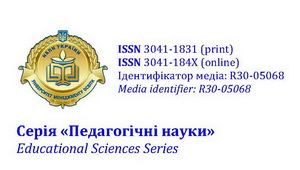Creative approach in modern education concept
Анотація
Ключові слова
Повний текст:
PDF (English)Посилання
REFERENCES / СПИСОК ВИКОРИСТАНИХ ДЖЕРЕЛ
M. İsmixanov, R. Bəxtiyarova, Məktəbin idarə edilməsi. Bakı, Azərbaycan, 2012. [Online]. Available: https://ru.scribd.com/document/812866054/Mektebin-Idare-Edilmesi-Kitab Application date: January 05, 2025.
R. Qəndilov, N. Zeynalova, Həyati bacarıqlara əsaslanan təhsil. Bakı, Azərbaycan : Çaşıoğlu, 2007.
Ə. Ə. Ağayev, Təlim prosesi: ənənə və müasirlik. Bakı, Azərbaycan : Adiloğlu, 2006.
Ə. Ə. Əlizadə, Müasir Azərbaycan məktəbinin psixoloji problemləri. Bakı, Azərbaycan : Pedaqogika, 2004.
N. Kazımov, Tətbiqi pedaqogika (ibtidai təhsilin pedaqogikası və metodikası ixtisası üzrə). Bakı, Azərbaycan : Çaşıoğlu, 2010. [Online]. Available: http://elibrary.bsu.edu.az/files/books_rax/N_355.pdf Application date: January 05, 2025.
E. Pometun, Encyclopedia of interactive learning. Moscow, Russia; Kyiv, Ukraine, 2007. [Online]. Available: https://issuu.com/anja_79/docs/pometun Application date: January 05, 2025.
D. B. Elkonin, Psychology of the Game. 2nd ed. Moscow, Russia: Humanitarian Publishing Center: Vlados, 1999. (подано російською).
T. M. Amabile, The Social Psychology of Creativity. Springer-Verlag, 1983.
A. H. Van de Ven, H. L. Angle, «An introduction to the Minnesota Innovation Research Program», In Research on the management of innovation; M. S. Pooke, Еds. New York, USA : Harper & Row, 1989, р. 3–30.
H. Gardner, Frames of Mind: The Theory of Multiple Intelligences. Basic Books, 1983.
K. Robinson, Out of Our Minds: Learning to Be Creative. Capstone Publishing, 2011.
Kreativ düşüncə və Təhsildə onun rolu. [Online]. Available: https://tehsil-zaman.blogspot.com/2016/05/movzu-kreativ-dusunc-v-thsild-onun-rolu.html Application date: January 05, 2025.
TRANSLATED AND TRANSLITERATED / ПЕРЕКЛАД, ТРАНСЛІТЕРАЦІЯ
M. Ismikhanov, R. Bakhtiyarova, School management. Baku, Azerbaijan, 2012. [Online]. Available: https://ru.scribd.com/document/812866054/Mektebin-Idare-Edilmesi-Kitab Application date: January 05, 2025. (in Azerbaijani).
R. Gandilov, N. Zeynalova, Life skills-based education. Baku, Azerbaijan : Çaşıoğlu, 2007. (in Azerbaijani).
А. Е. Aghayev, The educational process: tradition and modernity. Baku, Azerbaijan : Adiloglu, 2006. (in Azerbaijani).
А. Е. Alizadeh, Psychological problems of the modern Azerbaijani school. Baku, Azerbaijan : Pedaqogika, 2004. (in Azerbaijani).
N. Kazımov, Applied pedagogy (specialization in pedagogy and methodology of primary education). Baku, Azerbaijan : Chasioglu, 2010. [Online]. Available: http://elibrary.bsu.edu.az/files/books_rax/N_355.pdf Application date: January 05, 2025. (in Azerbaijani).
E. Pometun, Encyclopedia of interactive learning. Moscow, Russia; Kyiv, Ukraine, 2007. [Online]. Available: https://issuu.com/anja_79/docs/pometun Application date: January 05, 2025. (submitted in Russian). (in Russian)
D. B. Elkonin, Psychology of the Game. 2nd ed. Moscow, Russia: Humanitarian Publishing Center: Vlados, 1999. (submitted in Russian). (in Russian)
T. M. Amabile, The Social Psychology of Creativity. Springer-Verlag, 1983. (in English).
A. H. Van de Ven, H. L. Angle, «An introduction to the Minnesota Innovation Research Program», In Research on the management of innovation; M. S. Pooke, Еds. New York, USA : Harper & Row, 1989, р. 3–30. (in English).
H. Gardner, Frames of Mind: The Theory of Multiple Intelligences. Basic Books, 1983. (in English).
K. Robinson, Out of Our Minds: Learning to Be Creative. Capstone Publishing, 2011. (in English).
Kreativ düşüncə və Təhsildə onun rolu. [Online]. Available: https://tehsil-zaman.blogspot.com/2016/05/movzu-kreativ-dusunc-v-thsild-onun-rolu.html Application date: January 05, 2025. (in Azerbaijani).
Посилання
- Поки немає зовнішніх посилань.
